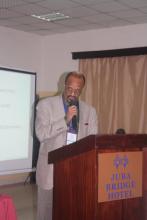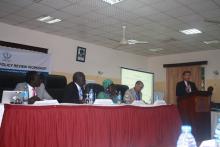Launch of South Sudan National Health Policy Review Workshop
The World Health Organisation is supporting South Sudan’s Ministry of Health to review its national policy as part of efforts to strengthen the country’s health system.
The process began with a three-day dialogue to review the National Health Policy 2007 – 2011, the National Health Sector Development Plan 2012 – 2016, the Ministerial Policy Statement Framework 2012 – 2016 and update the National Health Policy from 24 to 26 June 2014, in Juba, South Sudan
Speaking at the official opening of the policy dialogue, WHO Representative for South Sudan, Dr Abdi Aden Mohamed said the WHO African Regional Office encourages member states to strengthen their respective health systems, starting with health policies that articulate the critical choices for service delivery.
“It is very reassuring to us as WHO that South Sudan is committed to this guidance and is embarking on the reforms, starting with reviewing and updating the National Health Policy,” he said, adding that WHO is committed to providing the required technical assistance throughout the consultative process of the policy review, and commended the European Union for the collaborations with WHO for availing the financial resources in under taking the process of reviewing and updating the National Health Policy of the Republic of South Sudan.
South Sudan’s Minister of Health, Hon. Dr Riek Gai Kok expressed appreciation for such technical support and commended the role played by donors, health development partners and Non-Governmental Organisations (NGO) in improving the country’s health system. Significant financial, human, medicines, health supplies and health management information system support are from partners, and noted that in particular the support from WHO and partners eases pressure on Ministry of Health.
“This partnership has eased the pressure on the Ministry of Health as it figures out a long term strategy in tackling the health challenges facing the country” he said.
This is vital given that South Sudan has poor health indicators arising from limited investment into health systems and other determinants. The country, Dr. Riek said that has one of the world’s worst health and demographic indicators such as high maternal, neonatal and infant mortality rates. He expressed appreciation for WHO’s role in organizing the review and in supporting health systems work, and the European Union for providing the funding to WHO for that work.
Dr Aden described the trend as common in Africa South of the Sahara, which has one of the worst health indicators in the world. He attributed this to weak health systems fuelled by weak policies, inappropriate health systems organisation and mismanagement, coupled with inadequate health resources and poor regulation. For this reason, WHO will continue to support member states to strengthen their health systems.


